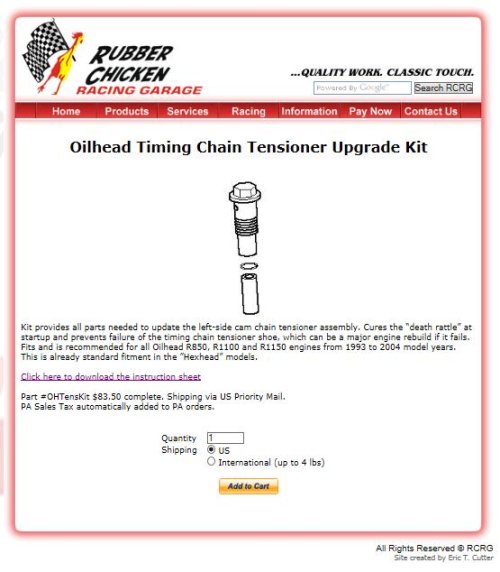bwanajames
New member
This is pretty much what most of us expected. Now, you have to make a decision of what you are going to replace...
Mr. 23217,
First of all, thank you for doing so much leg-work on my behalf regarding parts & pricing! Truly above and beyond!

Now, what am I going to replace? Yikes! Really good question! I do intend to keep the bike, so do I just replace everything "just because"? I guess if the bike had a zillion miles on it, the decision would be more clear. But 54k doesn't seem like high mileage, right?
 So, I've resigned myself to pulling off both heads and sending them to someone (perhaps Anton) and trusting their discretion on what needs to be done.
So, I've resigned myself to pulling off both heads and sending them to someone (perhaps Anton) and trusting their discretion on what needs to be done. Rings? Having never done it, it seems a bit daunting. But after taking my RT transmission apart, I suppose I'm up for anything.
I would see if the carbon canister is still connected...
Yes, it is... I've performed a canisterectomy on my RT and will do the same with the RS... (after she's doctored up...)
The next issue you need to address is the cam chain tensioner....
Thanks for bringing this to my attention. When I first heard of the upgraded tensioner, it just sounded like a nice thing to do to quiet a bit of rattle at start-up. But the more I read up on it, it sounds like it can become pretty catastrophic! I looked at my GS and RS and they both have the original 17mm bolt head (as opposed to the upgrade 15mm). Rubber Chicken Racing makes an Oilhead kit, and I bought two of them just last week! Thanks!






 Speaking of learning something... Some of you may be familiar with Chris Harris of Affordable Beemer Services in New Hampshire. He's created a number of very helpful Youtube videos, so I asked him who he trusted with reconditioning heads. Below is his response, which is interesting from several angles:
Speaking of learning something... Some of you may be familiar with Chris Harris of Affordable Beemer Services in New Hampshire. He's created a number of very helpful Youtube videos, so I asked him who he trusted with reconditioning heads. Below is his response, which is interesting from several angles: The reports I've read so far, all have a common theme: at the time of break-down, all were engaged in a "hold-on-to-your-hat" high rpm run. In my Shade Tree imagination, I could visualize the mechanical act of higher than normal piston cycling triggering the shedding of carbon bits which would - on their way out - become wedged under an exhaust valve and shear a chunk from it. An instantaneous act if you will.
The reports I've read so far, all have a common theme: at the time of break-down, all were engaged in a "hold-on-to-your-hat" high rpm run. In my Shade Tree imagination, I could visualize the mechanical act of higher than normal piston cycling triggering the shedding of carbon bits which would - on their way out - become wedged under an exhaust valve and shear a chunk from it. An instantaneous act if you will.